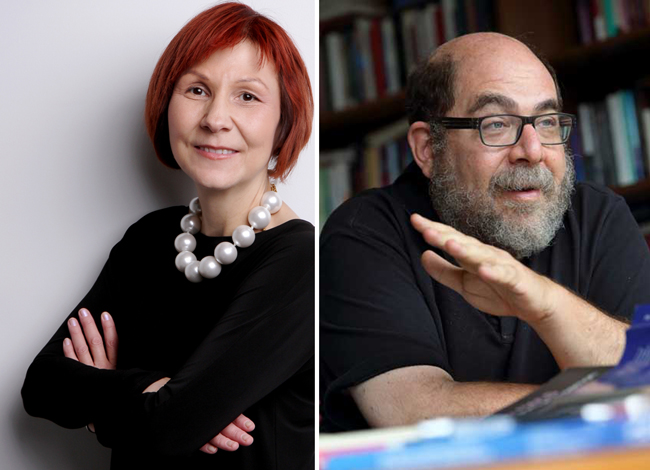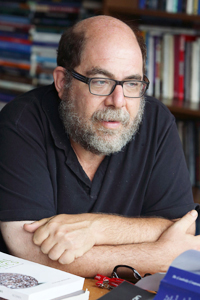
By McGill Reporter Staff
The Broadbent Institute, Canada’s leading progressive, independent organization championing change through the promotion of democracy, equality and sustainability, has honoured a pair of McGill faculty members. School of Social Work professor Cindy Blackstock was named winner of the 2017 Jack Layton Progress Prize; and Law Faculty professor Daniel Weinstock was awarded the Charles Taylor Prize for Excellence in Policy Research at the Institute’s convention, held in Ottawa from April 5-7.
The 2017 Progress Summit is the annual convention organized by the left-leaning think tank that carries the name of the former leader of the federal New Democratic Party Ed Broadbent.
Delegates gave Blackstock a standing ovation when it was announced that she had won the Jack Layton Progress Prize, which was given to her by Layton’s widow and former MP Olivia Chow.
One of the country’s leading activists for First Nations children, Blackstock was catapulted into the headlines in 2016 when the Canadian Human Rights Tribunal agreed with her complaint (filed jointly with the Assembly of First Nations) that the federal government discriminates against First Nations children on reserves by providing support that is far lower than that offered to children off reserves. It was a landmark ruling. Blackstock is Executive Director of the First Nations and Family Caring Society, the only national organization serving Aboriginal children and families.

Blackstock helped developed Jordan’s Principle and Shannen’s Dream. Jordan’s Principle aims to ensure that First Nations children can access public services ordinarily available to other Canadian children without experiencing any service denials, delays or disruptions related to their First Nations status. Shannen’s Dream is a movement advocating for equitable education funding for First Nations children.
Blackstock is a powerful and outspoken advocate for Canada’s first nations youth. In an interview with the McGill Reporter she said “I think universities have a critical role, particularly with First Nations education. It quite frankly concerns me when I see universities wanting to approve First Nations students, yet being silent about the fact that these First Nations kids, when they’re going to elementary and secondary school, are getting somewhere between 50 and 70 cents on the education dollar compared to other kids. Because the universities don’t want to speak out against the government. The result is that First Nations students have a far smaller opportunity to even walk through the doors of a place like this.”
The Gitxsan activist, who earned a Master’s at the Faculty of Management in 2000, returned to McGill with a teaching position in 2016 as a faculty member of the School of Social Work.
Daniel Weinstock is a Montrealer and head of McGill’s Institute for Health and Public Policy.
Weinstock did his BA and MA in Political Science and Political Philosophy at McGill, and a DPhil in Political Philosophy from Oxford University. From 1988 to 1989, he was a visiting doctoral student at Harvard University. He completed postdoctoral work in the Department of Philosophy at Columbia University, before joining the Department of Philosophy of the Université de Montréal in 1993. From 2002 to 2011, he was the Founding Director of the Centre de recherche en éthique de l’Université de Montréal.

In 2012, Weinstock became a professor in the Faculty of Law and in the Department of Philosophy of McGill. In 2013, he was appointed as Director of McGill’s Institute for Health and Social Policy.
Weinstock’s research interests have spanned a broad range of topics in contemporary moral and political philosophy – from the just management of ethnocultural and religious diversity in modern liberal democracies, to state policy with respect to children, families and educational institutions. His main research interests at present have to do with the problem of health equity, and with issues of justice and inclusion as they arise in the organization of modern cities.
In 1997, Weinstock was awarded a teaching prize by the Faculté des arts et des sciences de l’Université de Montréal for his innovations in developing ethics and public policy courses for the health sciences, and in 1998 he received a teaching prize awarded by the Université de Montréal to its most distinguished teachers at the University-wide level.
He has held both a Tier I and a Tier II Canada Research Chair in Ethics and Political Philosophy at the Université de Montréal.
In 1998, Weinstock was awarded a fellowship both to the Rockefeller Center for Human Values at Princeton University, and to the Safra Center for Ethics at Harvard University. He spent the 1998-1999 academic year as a Rockefeller Fellow at Princeton. In 2004, he was made a Prize Fellow of the Pierre-Elliott-Trudeau Foundation, and in 2008, he received the Prix André-Laurendeau from the Association canadienne-française pour l’avancement des sciences.
